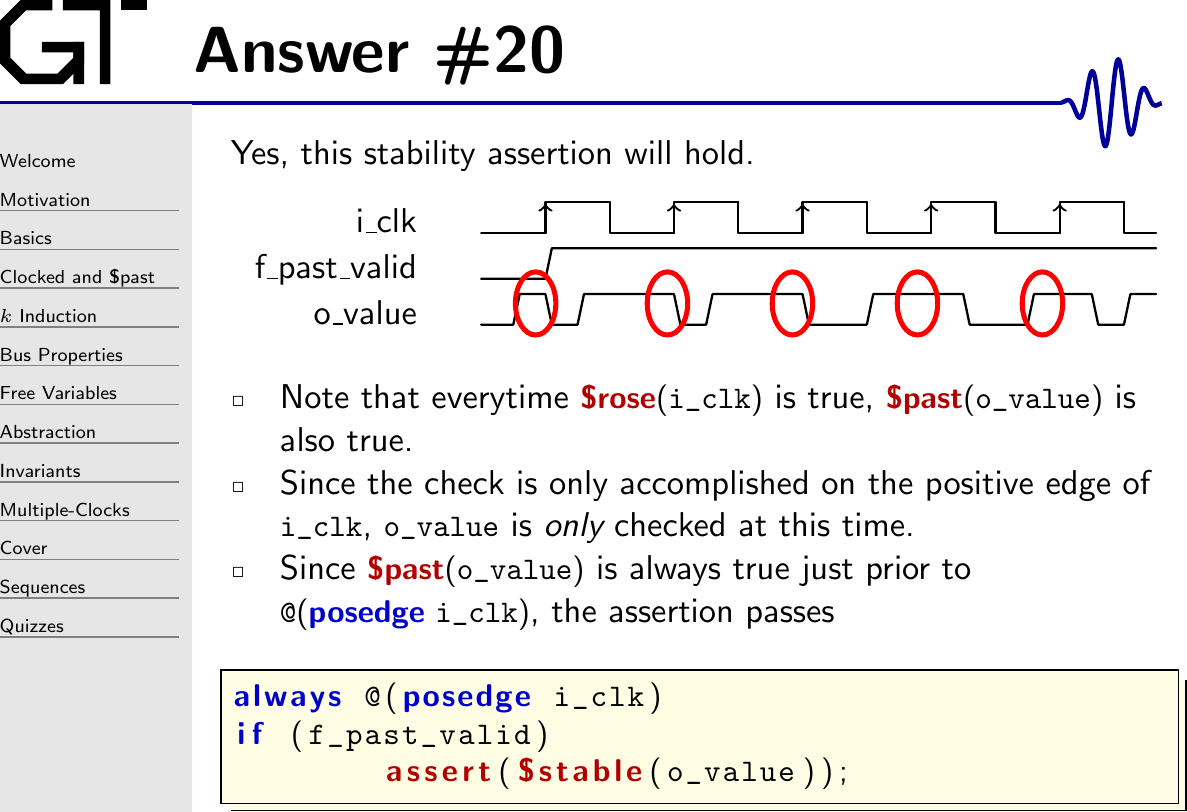Answer to Quiz #20
 |
The key to understanding what’s going on here lies in understanding how $stable and $past work.
$past, for example, works like a simple registered value.
reg _past_o_value;
always @(posedge i_clk)
_past_o_value <= o_value;There’s a couple of things to note in this implementation.
-
_past_o_valuehas no initial value. This is why I use anf_past_validregister–to force checks to only take place after the first clock that has given_past_o_valuea valid value. -
With any temporal property, such as
$past, understanding the clock edge is relevant. In this case,$past(o_value)is defined by the clock edgeposedge i_clk. Ifo_valueis not synchronous withi_clk, this edge will probably not make any sense–as you can see from the example above.
Now that we know how $past works, let’s go back and look at the quiz question.
If you look carefully, you’ll see that just prior to every clock edge I
carefully made certain that o_value would be high. That means that every
$past(o_value) expression (equivalent to _past_o_value above) would be
a constant high value–once the first clock edge had passed.
The next key piece to this quiz is that $stable(X) is equivalent to
X == $past(X). Hence, we might rewrite this assertion as:
always @(posedge i_clk)
if (f_past_valid)
assert(o_value == _past_o_value);using our definition of _past_o_value above.
The final piece is the check register used within the formal engine itself.
In this case, that check register would look like:
reg assertion_success;
initial assertion_success = 1;
always @(posedge i_clk)
begin
assertion_success <= 1;
if (f_past_valid)
assertion_success <= (o_value == _past_o_value);
endThe formal tool will then use this assertion_success register on every time
step. If the assertion_success register, associated with a given assertion,
is ever zero, then the assertion fails.
always @(*)
assert(assertion_success);Herein lies the problem: the assertion_success register is only ever set
on a positive edge of the clock. Just before that edge, the value is always
high. Therefore the assertion passes even though o_value changes between
clock periods!
If you want to guarantee a value that’s always stable, you might wish instead to use the formal time step for your checks.
(* gclk *) reg formal_timestep_clock;
always @(posedge formal_timestep_clock)
if (f_past_valid)
assert($stable(o_value));That should cover everything except how f_past_valid relates. For
example, should f_past_valid be set on i_clk or formal_timestep_clock?
I’ll leave that last piece, though, as an exercise for the student.
